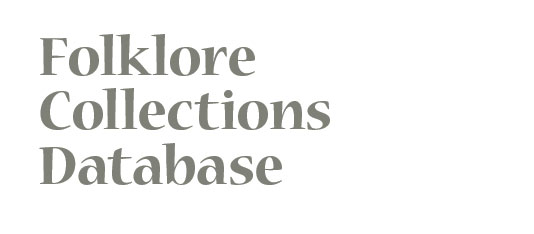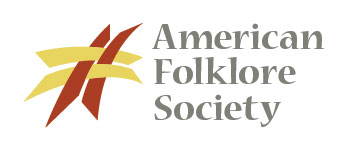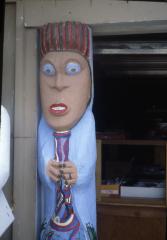Administrative/Biographical History Element“Passed to the Present: Folk Arts Along Wisconsin’s Ethnic Settlement Trail” featured folk arts and artists in communities along Lake Michigan. Envisioned as a three-stage project, it included 1) a field survey of artists and craftspeople in communities along the Lake Michigan shoreline in eastern Wisconsin, 2) a traveling exhibition and an accompanying exhibition catalogue, and 3) a directory which would make the artists’ work more accessible to heritage institutions and other residents and visitors to the area. Wisconsin’s Ethnic Settlement Trail (WEST), a historic preservation organization established in 1991, had been collaborating with the Cedarburg Cultural Center (CCC) since its inception to promote cultural tourism in eastern Wisconsin. James P. Leary and Janet C. Gilmore’s previous fieldwork in the state for the Kohler Arts Center in Sheboygan provided the basis for further fieldwork for this project. Research for a previous CCC traveling exhibition, “In Tune With Tradition: Wisconsin Folk Musical Instruments” (1990-1991), also contributed to this project, since organizers reestablished connections made for the earlier exhibition. The exhibition featured eighteen artists, representing thirteen communities (African American, Armenian, Czech, Danish, German, Hispanic, Holland Dutch, Hmong, Oneida, Polish, Slovak, Slovenian, and Ukrainian). The directory included thirty-one artists, out of an initial group of 100-150 artists.
The National Endowment for the Arts, the Fund for Folk Culture at the Lila Wallace-Reader’s Digest Community Folklife Program, and the Wisconsin Arts Board provided funding for “Passed to the Present.” After opening in January-February 1994 at the University of Wisconsin-Milwaukee Art History Gallery, the exhibition traveled to the Oshkosh Public Museum, the Mead Public Library in Sheboygan, the Cedarburg Cultural Center (running concurrently with the Museum of International Folk Art’s national traveling exhibition, “America’s Living Folk Traditions”), the Miller Art Center in Sturgeon Bay, the Kenosha Historical Society Museum, the Neville Public Museum in Green Bay, and the Racine County Historical Society and Museum, where it ended its tour in July 1995.
Scope and Content NoteThe collection is arranged in four series: Manuscript Materials, Sound Recordings, Graphic Materials, and Artifacts.
The Manuscript Materials consist of Administrative Materials and Research Materials. Administrative Materials document the planning process and implementation of the exhibition, as well as changes made due to reduced levels of funding or achieved through a reallocation of funds. Research materials for the exhibition consist of field reports on the artistic traditions and potential artists for project inclusion prepared by James P. Leary or Mary Zwolinski; files include fieldnotes, consent forms, correspondence, supporting materials, tape logs, and slide indexes.
Sound Recordings consist of interviews with the folk artists, twelve conducted by James P. Leary (June-August 1993) and ten conducted by Mary Zwolinski (July-September 1993), one recording of a Slovenian Harvest Picnic, and one commercial recording of the Badger Button Box Club, a button accordion band based in Milwaukee. All sound recordings consist of audiocassette tapes.
Graphic Materials consist of slides taken by James P. Leary and Mary Zwolinski during the fieldwork conducted for the exhibition, with contact sheets for some images; and black-and-white photographs, contact sheets, and slides by Lewis Koch and James P. Leary. Researchers should note that some of the images taken for this project were also used for a later Cedarburg Cultural Center exhibition, "Wisconsin Folk Art: A Sesquicentennial Celebration." Users should check the Graphic Materials series of that collection for additional images.
The Artifacts consist of two paper cutting cards by Bernie Jendrzejczak.
Custodial HistoryThis collection is one of three related to exhibits created by the Cedarburg Cultural Center (Cedarburg, Wisconsin) during the tenure of Robert T. Teske as director (1987-1998). Since Teske’s departure from the Center in the late 1990s, the collections remained in basement storage until they were transferred to the Center for the Study of Upper Midwestern Cultures (CSUMC) in 2012. Two folders of grant materials relating to this exhibit were among Teske’s administrative materials, and deemed to be part of this collection at the time of transfer to CSUMC’s care. A deposit agreement between CSUMC and the University of Wisconsin-Madison Archives is planned, but not yet formalized.
Conditions Governing Access
Contact records custodians for access information.
Center for the Study of Upper Midwestern Cultures
432 East Campus Mall, Room 332
Madison, WI 53706
608-262-8180
Web site: http://csumc.wisc.edu
Conditions Governing ReproductionConsult the Center for the Study of Upper Midwestern Cultures for information on use restrictions.


